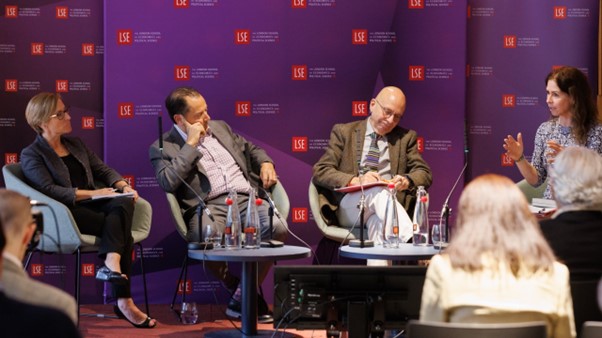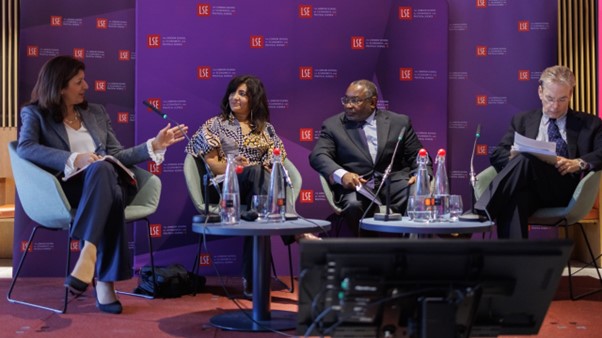 On Saturday 21 October, the Phelan US Centre hosted the conference, The Future of Capitalism in an Age of Insecurity, which brought together leading scholars and analysts to examine the effects of geopolitical turmoil, democratic discontent, anti-globalism, and technological change on capitalist economies. The second conference panel, Populism and Democratic Capitalism, featured Professor Sheri Berman (Barnard College), Professor Ian Shapiro (Yale University), and Luigi Zingales (University of Chicago). Josette Peacock gives an overview of the panel and the Q&A segment.
On Saturday 21 October, the Phelan US Centre hosted the conference, The Future of Capitalism in an Age of Insecurity, which brought together leading scholars and analysts to examine the effects of geopolitical turmoil, democratic discontent, anti-globalism, and technological change on capitalist economies. The second conference panel, Populism and Democratic Capitalism, featured Professor Sheri Berman (Barnard College), Professor Ian Shapiro (Yale University), and Luigi Zingales (University of Chicago). Josette Peacock gives an overview of the panel and the Q&A segment.
On October 21st, amidst recent global economic challenges and the ongoing rise of populist movements, as part of the LSE Phelan US Centre’s conference, The Future of Capitalism in an Age of Insecurity, the panel discussion, Populism and Democratic Capitalism, chaired by Stephanie Rickard, Professor of Political Science in the Department of Government at LSE, brought together leading experts in populism and democracy during political discontent and volatility: Professor Sheri Berman, Professor of Political Science at Barnard College, Columbia University; Professor Ian Shapiro, Sterling Professor of Political Science at Yale University; and Professor Luigi Zingales, Robert C. McCormack Distinguished Service Professor of Entrepreneurship and Finance at The University of Chicago Booth School of Business.
Professor Berman explained the intricate relationship between capitalism and populism. She debunked the notion that capitalism directly causes populism, arguing that populist movements often mobilize around social and cultural grievances rather than economic ones. While concerns such as immigration and the rise of minority groups may seem related to populism, Professor Berman argued that these issues alone don’t account for the trend. Instead, Berman suggested that capitalism’s negative consequences create fertile ground for the salience of diverse ethnic identities. Right-wing populists then exploit this focus on racial and ethnic identities, making it challenging for left-wing parties to gain electoral support. To reform contemporary capitalism, the focus must shift back to economic issues and build coalitions on the left to weaken right-wing populist parties.
Professor Shapiro highlighted the transition to a service-based economy and the effects of globalization as the underlying causes of populism. He argued that job insecurity and the hollowing out of the middle class have contributed to the rise of populism. Professor Shapiro also discussed the fragmentation of political parties, particularly on the left, which has weakened two-party systems and increased identity politics. Shapiro emphasized that left-of-center parties need to return to economic campaigning and prioritize addressing economic insecurity, which is a key driver of populism.
Listen to a recording of the panel event – Populism and Democratic Capitalism
Professor Zingales then examined the relationship between capitalism and democracy. He argued that capitalism, when favoring inequality, can coexist with democracy. However, when even the rules of the game are for sale, it can lead to oligarchy. Zingales suggested that populism should not be viewed negatively and pointed out that the focus on identity politics has sometimes been counterproductive for the left, as it alienates a significant portion of the electorate. Professor Zingales argued that restricting voting rights and manipulating electoral systems can exacerbate disaffection and lead to the emergence of extreme ideologies. He also noted that even the media has become increasingly controlled by oligarchs, which can further influence public opinion.
The panel Q&A session
During the Q&A session, the panelists discussed practical steps to shift the political discourse toward economic issues. They recognized the need for compensation to assist those who have lost from the current system and address economic grievances. Suggestions included policies like universal healthcare, training and retraining programs, and subsidies for job relocation. The role of leadership and the power of persuasive leaders were also acknowledged in shaping political narratives.
The panelists stressed the importance of mainstream political parties returning to economic campaigning to counteract the divisive effects of identity politics. The panelists briefly discussed the definition of populism, noting that it often involves a distrust of experts and a distinction between the elite and ordinary citizens. In a world where populism and economic insecurity continue to shape politics, the panelists’ insights shed light on potential paths forward, emphasizing the need to address economic issues, rebuild coalitions, and create a more inclusive and secure future for all.
Watch the conference video – The Future of Capitalism in an Age of Insecurity
- Listen to a podcast of the event [LSE Player]
- Please read our comments policy before commenting.
- Note: This article gives the views of the author, and not the position of USAPP – American Politics and Policy, nor the London School of Economics.
- Shortened URL for this post:https://bit.ly/3sAzhBn




